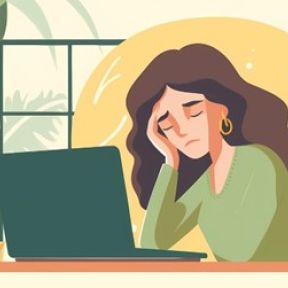Mental Health and Productivity
Mental health and productivity are closely linked. Poor mental health, manifesting most often as depression, anxiety, or burnout, can severely decrease motivation and production while increasing stress, leading to it can have serious consequences for a person and their relationships. Other mental health disorders, like ADHD, can interfere with focus and attention and make it much harder to get things done.
Treating mental health issues, as well as promoting wellness in general, often leads to increased productivity. But productivity is far from the only reason to seek treatment; in fact, productivity as the sole end goal can itself interfere with mental health and overall quality of life. Relationships, health, relaxation, and more broadly, beyond simply checking things off a to-do list, all contribute to long-term life satisfaction, and one goal of productivity is making time and space for a complete existence.
Different mental health disorders may have different symptoms, but their effect on productivity can appear very similar to the untrained eye. Trouble concentrating, difficulty staying motivated, and memory problems can show up, whether someone has ADHD, depression, or anxiety. Burnout can also manifest as similar symptoms, but it's not technically a mental health disorder; it is currently classified as an "occupational phenomenon" by the World Health Organization. Those wondering if they are struggling with burnout, depression, or something else should first examine the domains in which their symptoms appear. If they only feel unfocused and ineffective at work, for example, but aren't struggling elsewhere, it may be indicative of burnout. If problems persist in all areas of life, it is more likely that they are dealing with another mental health disorder, such as depression. Seeking an accurate diagnosis can be an important step in improving the problem.
In some cases, yes. ADHD symptoms related to inattention can make it hard for someone to focus on the task at hand; they can be easily distracted or drift off to sleep. Hyperactive symptoms can also hamper productivity. Someone who is physically restless, for example, may be on their feet or move frequently, and will probably find it difficult to complete a task that requires them to sit or stay in one place. On the other hand, some people with ADHD experience periods of "hyperfocus," in which they may focus intensely for certain periods of time. It is possible to take advantage of hyperfocus to increase productivity.
On both the individual and social levels, depression greatly interferes with productivity. At work, depressed employees are estimated to cost billions in lost production and increased health care costs each year.
When a depressed person feels unable to do anything in their daily life, from their responsibilities at the workplace to small chores around the house and fun activities they used to enjoy, it can take a great mental toll. Faced with endless despair, many depressed people find themselves more likely to curl up on the couch for hours than to dive into a new project or tackle their to-do list. While this is a common and understandable response, feeling unproductive for long periods of time can aggravate depression and can lead to further consequences, such as losing a job or piling up bills.
Yes. Some people try to deal with depression by focusing too much on being productive; this is more likely if symptoms of lethargy are less prominent. Getting things done, even small and relatively meaningless tasks, can help distract someone from the negative emotions and apathy that are inherent in depression. While "small wins" and a general feeling of productivity can help combat depression, some high-energy people may use hyperproductivity to mask their depression or try to ignore its existence.
Although short-term situation-based anxiety (the nerves one feels before taking a test, for example) can increase alertness and potentially boost performance, chronic anxiety often gets in the way of doing things. stuff. Physical symptoms, such as restlessness or tension, can make it more difficult to sit still or focus on a task. Anxiety can also disrupt sleep and further impair focus.
The cognitive symptoms of anxiety are often the biggest obstacles to productivity. Excessive worry can consume someone's thoughts, making it hard for them to focus on what they're doing, plan ahead, or remember what to do next. Anxiety is also a major factor in procrastination; For example, if someone is worried that they won't be able to do a project well or that their boss secretly dislikes them, they may postpone starting a task in an attempt to avoid those negative feelings and feared outcomes.
Key symptoms of work-related burnout include physical and emotional exhaustion; a feeling of dread associated with going to work or completing tasks while there; and feelings of cynicism, apathy, and depression that are present primarily in a work-related context. Parents or other caregivers may also experience burnout; in this case, the symptoms will be similar, but will be primarily related to one's role as parent/caregiver.
It's not always easy to take steps to support mental health and improve well-being. But it's worth the effort most of the time. While in the case of a mental health disorder, an accurate diagnosis can help tailor professional treatment, it is not always necessary. There are many lifestyle approaches, such as prioritizing sleep, eating a healthy diet, exercising regularly, and setting boundaries between work and life, that can provide some relief, regardless of specific challenges. In addition to directly targeting negative symptoms, improving long-term wellness may also require stepping back and assessing the big picture. Many people find that maximizing wellness requires balancing their desire for productivity with other important priorities like rest, relationships, and a greater sense of purpose.
When someone is burning out at work, you should first identify what is causing the burnout feelings and try to address them head-on. Researchers have highlighted several common culprits, including overwork, lack of autonomy or control, negative work environments, unfair or unethical organizational practices, or conflicting values.
Possible solutions include setting strict boundaries between work and life, talking to supervisors about reducing workload, or addressing cultural toxicity, and prioritizing healthy sleep, diet, and exercise. Seeking therapy can also be helpful in addressing feelings of inadequacy or anxiety. If these short-term solutions don't provide relief, it may be necessary to find a new job or change careers altogether.
Increasing productivity is just one of the countless benefits of properly treating anxiety and depression. Along with improved mood, more satisfying relationships, and reduced stress, those who find a treatment for anxiety or depression that works for them often report increased focus, motivation, and energy to tackle important tasks and pay attention to what's on their minds. matters more. Treatment may include psychotherapy, medication, lifestyle changes, or some combination.
Effective treatment of ADHD, whether through medication, cognitive behavioral therapy, dietary changes, exercise, or otherwise, will usually result in a marked increase in productivity. Medications, which directly target symptoms of inattention or hyperactivity, can make it easier for a person to concentrate. Therapy, on the other hand, often focuses on teaching people skills to stay organized and motivated, while also addressing maladaptive thought patterns that can interfere with productivity. Lifestyle changes, particularly diet and exercise, can help the brain produce key neurotransmitters, such as dopamine, which are thought to be low in the brains of people with ADHD and critical for motivation , learning and attention.
Productivity is valuable, both for societies and for individuals. But it's possible to prioritize productivity too much, to the detriment of mental health, which can trigger stress, burnout, or apathy.
Those seeking greater balance can start by setting strict boundaries between work and the rest of their lives (not checking work email outside of business hours, for example) and allowing more unstructured time away from work. In a culture that glamorizes hustle and bustle, doing nothing can seem like a waste of time. But many of the most successful people deliberately leave room for rest, with good reason. The brain and the body need time to recharge, to begin with. But rest itself can enhance future productivity by increasing creativity and allowing the mind to wander; The biggest advocates of idleness argue that deliberate rest is key to some of its best ideas.














